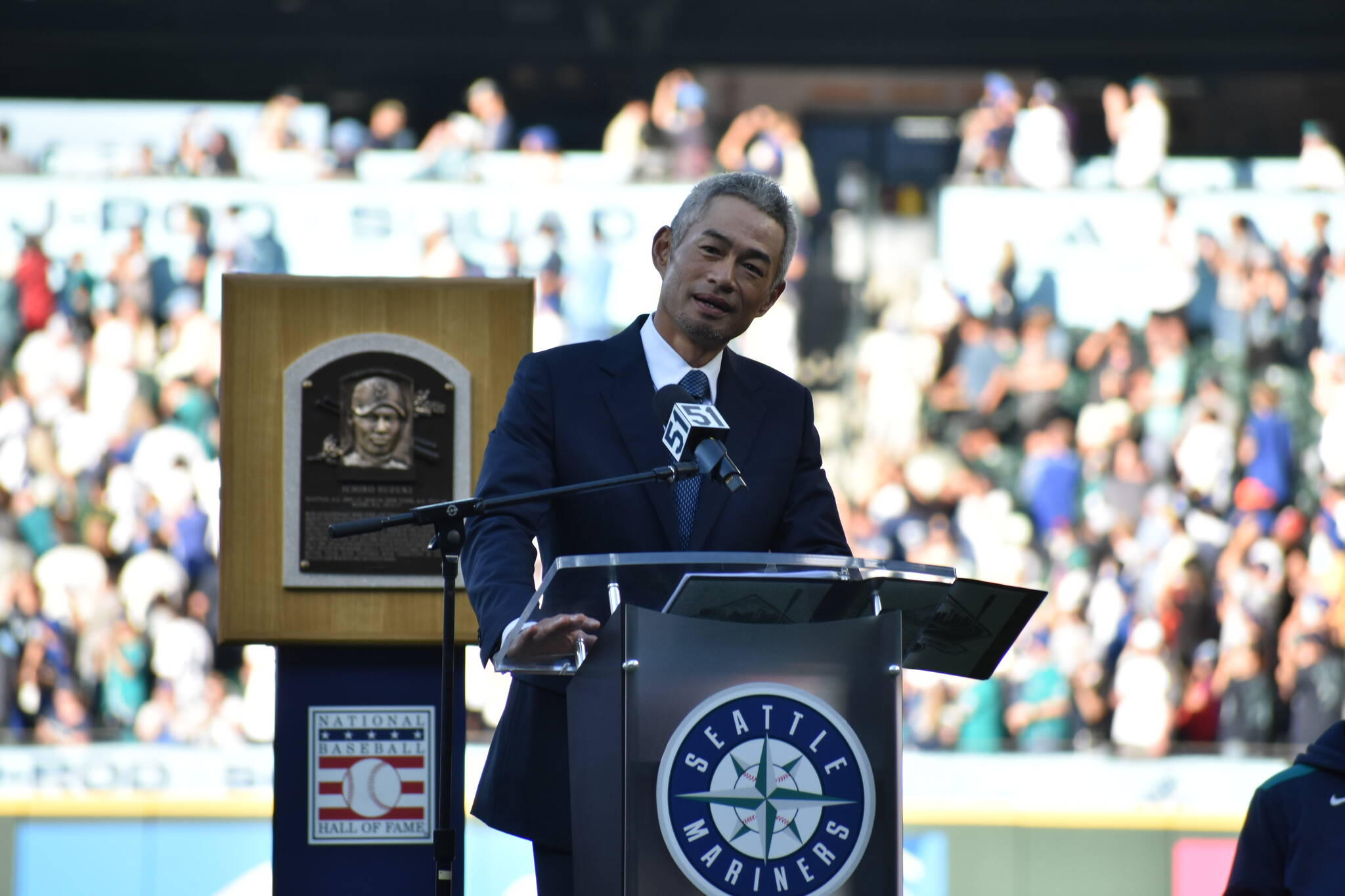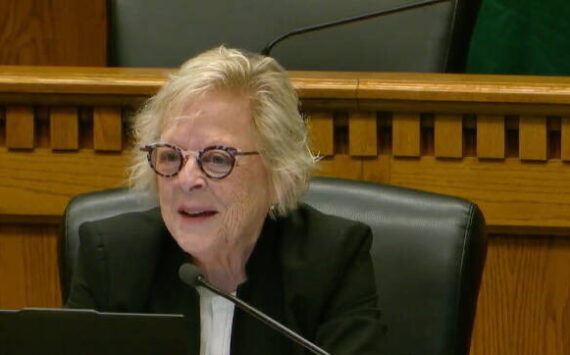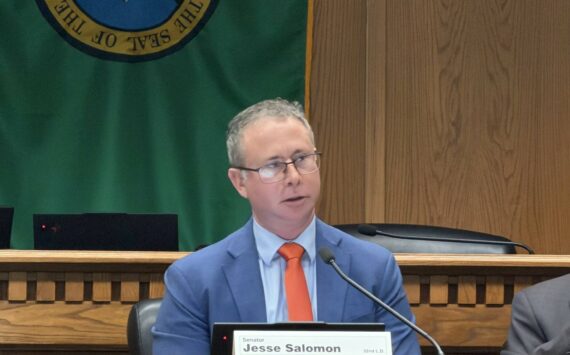In terms of franchise altering players, there aren’t many in Mariners history like Ichiro Suzuki.
The native of Toyoyama, Japan, had his number 51 retired on Aug. 9 before a game between the Mariners and the Rays. He is the third Mariner to have his number retired following Ken Griffey Jr. and Edgar Martinez.
It’s hard to tell if Ichiro made a bigger impact on or off the field for the Mariners in his 26 years of being associated with the club. From breaking the single season hit record, to helping form Julio Rodriguez and others into the stars they are today, his impact is all over the T-Mobile Park grounds.
Following a tribute video, Ichiro strolled in from center field, paraded by applause while the famous chant “I-CHI-RO” echoed throughout all of Seattle, as has been the norm for his entire career.
Ichiro had a unique relationship with Mariner fans. On the surface, he was someone new to the U.S. and spoke English as a second language. But there was something to him, and over the years, people came to adore Ichiro. And his personality paired with his ability to be a magician on the baseball field made him quickly a Mariner legend
“I am so grateful to be here today to receive the highest honor. But whose idea was it to have me give two speeches in English in two weeks. It is one of the toughest challenges of my career,” Ichiro said to open his number retirement speech, getting a laugh out of 45,000 people.
It is also no mistake that the first sell-out crowd of the season came on such an occasion — no giveaways, no freebies, just Ichiro.
“I am damn proud to be a Seattle Mariner. I realized by going away, there really is no place like home,” Ichiro said. “I could never express this great honor without the support of you, fans. Thank you Seattle.”
He was named to the National Baseball Hall of Fame in January and officially inducted more recently in July. He is the first Japanese born baseball player to reach the National Baseball Hall of Fame in Cooperstown, N.Y., which is fitting because he was the first ever Japanese position player to reach American shores.
While playing for the Orix BlueWave in Kobe, Japan, Ichiro was given the number 51, which he wore for nine seasons. When he signed with the Mariners, Randy Johnson was the last player to wear 51. Johnson said yes to Ichiro wearing his former number, and Ichiro noted how impactful that decision was on him.
“I am most grateful for the actions of another person who is here, Randy Johnson. He was number 51 long before I arrived in Seattle. Without his generosity, I could not have worn that number here,” Ichiro said. “For nine years in Japan, that was the only number I ever had. By the time I came to Seattle, 51 was a part of my identity. But I knew that number already had rich history here.”
51 is now one of the most iconic numbers in baseball, and Ichrio relished how important Johnson is to him.
“When you said 51 in Seattle, you knew it meant Randy Johnson from his great achievements from 1989-1998 in that uniform. When I came here in 2001, I could not have worn that number without his consent, and he gave it graciously,” Ichiro said.
He ended his acknowledgement of Randy Johnson with a simple request.
“I am grateful for Randy to attend my ceremony today. It will be my honor to attend his next summer… The way he has reached out to me warmly and gotten to know me, I feel more comfortable calling him Randy. I hope we can play catch together sometime,” Ichiro said.
Ichiro’s records are just a footnote to the type of player he is. By far one of the most detail-oriented baseball players in Mariners history, that passion still resides in him. The day before his ceremony, he was shagging batting practice.
During the ceremony, he addressed the Mariners who were watching inside the first-base dugout. He discussed how when he first came to Seattle, the Mariners tied the 1906 Chicago Cubs, but in the following years, winning was a luxury rather than a reality.
“We made it to the American League Championship Series (in 2001) and I took our success for granted, but as Edgar (Martinez) and Dan (Wilson) know, winning is tough. Now, this year’s team has a great opportunity. You guys are strong and talented. Please do not take your talent for granted. You have a great team and a great opportunity in front of you. I understand there is pressure to win, but the thing about winning is it is always tough and never comes without pressure.
“Accept the pressure and figure out how you can perform at your best under pressure. Although I can no longer help you guys with a hit or laser beam throw, my will and desire will always be there for you. I come to the field every day because I want to help you to be prepared for the moment. I am confident you guys can seize the moment, “ Ichiro said.
Mariner Skipper Dan Wilson has probably the most unique vantage point of Ichiro throughout the years: The playing days, when the two played together from 2001-2005, and since then as a manager these last two years.
“I said all along as a player that I was very fortunate to be in Seattle during a time when there were so many great players. Great players make other players around them better, and I feel like I was a direct recipient of that,” Wilson said in a pregame press conference on Aug. 9.
“I’m just grateful for the people that I got to play with. Not only do you learn about yourself as a player, but a person as well. All of those guys [Edgar Martinez, Ken Griffey Jr., Ichiro] challenged all of us, and we’re better for it. It’s just a fitting honor that (Ichiro’s) number will be out there (in center field) with all of theirs.”
An overlooked and often forgotten part of Ichiro’s journey was he came to Seattle when he was 27. Not 18, not 21, not 25 even — 27 years old. He has the MLB record of hits in a single season (262), set the record for most consecutive Gold Gloves to begin a career (10), and is one of two players ever to win MVP and Rookie of the Year in the same season. Ichiro had 10 200-hit seasons, tying Pete Rose for most all time, and is one of four players to record 3,000 hits (3,089) and have 10 Gold Gloves.
“He was just an incredible player with the bat in his hand, and then on defense as well. The arm strength, his ability to get to the ball… all of the things you want in an outfielder, he was that and more,” Wilson said.
Mariners majority owner John Stanton also announced the Ichiro would be the fourth Mariner to have a statue at T-Mobile Park, joining Dave Niehaus and fellow hall of famers Ken Griffey Jr. and Edgar Martinez. If there is one pose for a statue, Ichiro’s statue is going to be no secret.
“In 2026, we will honor the most prolific hitter our game has ever seen — the man who holds the all-time record for hits in a season; the man who has more global hits than any other player in the history of baseball,” said Stanton during his pregame remarks at T-Mobile Park. “Next year, to celebrate his transcendent international role in baseball and his leadership of the Seattle Mariners, we will build a statue of Ichiro Suzuki.”
The full personality of Ichiro was on display, even holding back tears during tribute videos and speeches from Dan Wilson and Rick Rizzs. But when he stepped up to the podium, he made no mistake to put his own humor and brilliance in his speech.
“It was your call on November 11, 2001, that helped establish my identity as number 51 in Seattle. Unfortunately you could not be in Cooperstown to hear my impersonation of your call. I need to know how you grade it,” Ichiro said as he proceeded to impersonate Rizzs.
“Holy smokes what a laser beam throw by Ichiro!” — which got Ichiro a huge round of applause.
Ichiro is now permanently etched and connected to T-Mobile Park, and the day after his number retirement, he was in full uniform stretching and warming up with the team just like the day before he wasn’t the most popular man in baseball.





